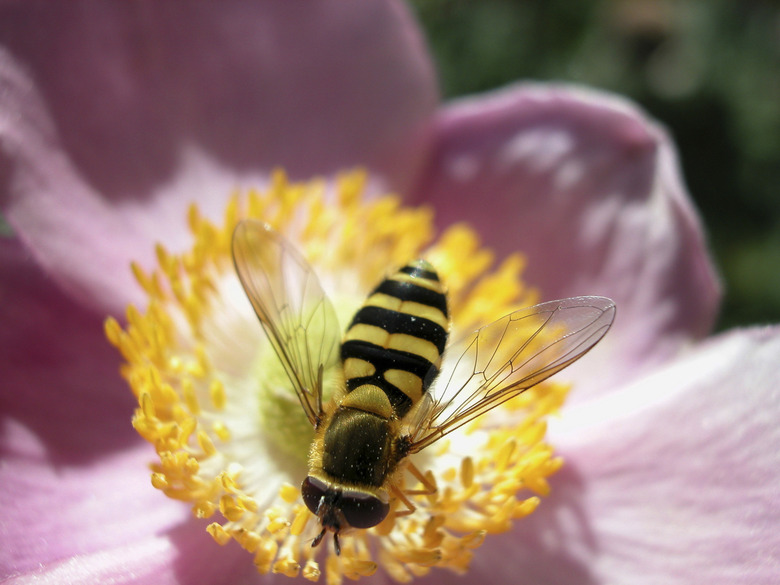Does Roundup Weed Killer Kill Insects?
Roundup weed killer, a nonselective, postemergence herbicide marketed by the Monsanto company, is absorbed by plant leaves and stems. Interruption of enzymatic processes stops plant growth and leads to plant death. The active ingredient, glyphosate, is broken down by microbes in soil, where it has no further impact on plants. According to the Monsanto ecological information statement on the product label, Roundup weed killer is "practically nontoxic" to arthropods, with the honeybee the tested subject.
Step 1
Federal regulations specify the proper use of environmental claims. Title 16, Commercial Practices, General Statute 260.10 limits the use of the term "nontoxic" to those products scientifically tested and with results supported by reliable evidence that the product is not harmful. Nontoxic classification is given to those products for which the lethal dose that kills 50 percent of the exposed subjects — LD50 — is a high dose. According to the Monsanto label, oral or contact exposure with a dose greater than 100 micrograms per bee was lethal within 48 hours. Roundup is classified as practically nontoxic due to the relatively large value of 100 micrograms per bee.
Honeybees
Step 1
Honeybees make a significant contribution to the United States economy through production of honey and beeswax. But one of these bees' most valuable contributions to the economy is their function as pollinators of fruits, vegetables and other insect-pollinated crops. Because of their importance to agriculture and the economy, honeybees are an appropriate subject for environmental testing by makers of herbicides and pesticides. According to the University of Rhode Island Landscape Horticulture Program, herbicides are generally nontoxic to honeybees.
Step 2
- Federal regulations specify the proper use of environmental claims.
- Because of their importance to agriculture and the economy, honeybees are an appropriate subject for environmental testing by makers of herbicides and pesticides.
Ecology
Step 1
Insect populations decline for various reasons, including scarce food supplies. Researchers John M. Pleasants and Karen S. Oberhauser, according to a study reported in "Insect Conservation and Diversity," link the reduced populations of milkweed plants (Asclepias spp.) in the Midwest with declining numbers of monarch butterflies. Milkweed plant species, which grow in U.S. Department of Agriculture plant hardiness zones 4 through 10, are the single host plant for monarch butterfly larvae. The researchers point out that milkweed plants are killed when glyphosate-based herbicides, such as Roundup, are sprayed on genetically modified crop plants that are not effected by the herbicide. Without a food source, monarch butterflies are not able to complete their life cycles, resulting in significant losses of this insect to the environment and making Roundup weed killer an inadvertent killer of monarch butterflies.
Conclusions
Step 1
By design, Roundup weed killer interferes with a plant's growth process. An understanding of this process paved the way for genetically modified agricultural crops that are not affected by Roundup, enabling agricultural workers to spray an entire field without regard to protecting the desired crop plants — making it possible to eradicate large populations of weeds. Although all but crop plants are weeds in an agricultural field, many weeds are part of the ecology of certain insect species. The loss of habitat or food sources kills these insects. The active ingredient in Roundup, glyphosate, does not affect insects in the same way it impacts plants, but it does kill insects, either directly — as in the case of a small number of honeybees in Monsanto's research — or as a consequence of killing weeds.
Step 2
- Insect populations decline for various reasons, including scarce food supplies.
- Without a food source, monarch butterflies are not able to complete their life cycles, resulting in significant losses of this insect to the environment and making Roundup weed killer an inadvertent killer of monarch butterflies.
References
- Michigan State University Extension: Killing Weeds in the Garden with Glyphosate
- United States Environmental Protection Agency: Environmental Marketing Claims
- U.S. Government Printing Office: Non-Toxic Claims
- National Pesticide Information Center: Acute Toxicity
- University of Minnesota: UM News: Milkweed Loss Hurts Monarchs
- Insect Conservation and Diversity: Milkweed Loss in Agricultural Fields Because of Herbicide Use: Effect on the Monarch Butterfly Population
- U.S. Forest Service: Importance of Milkweed
